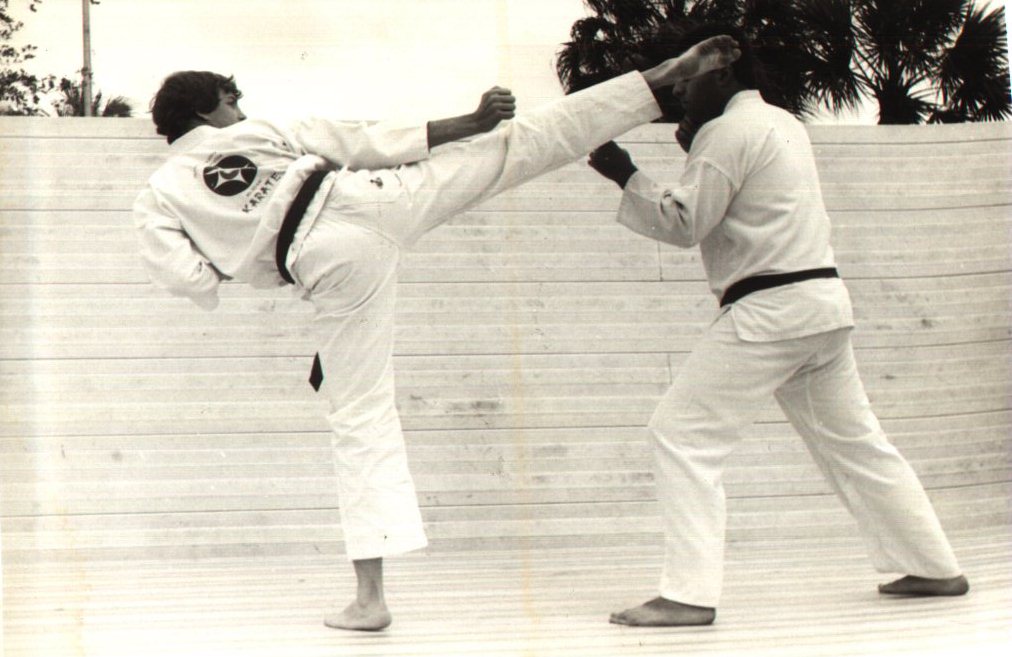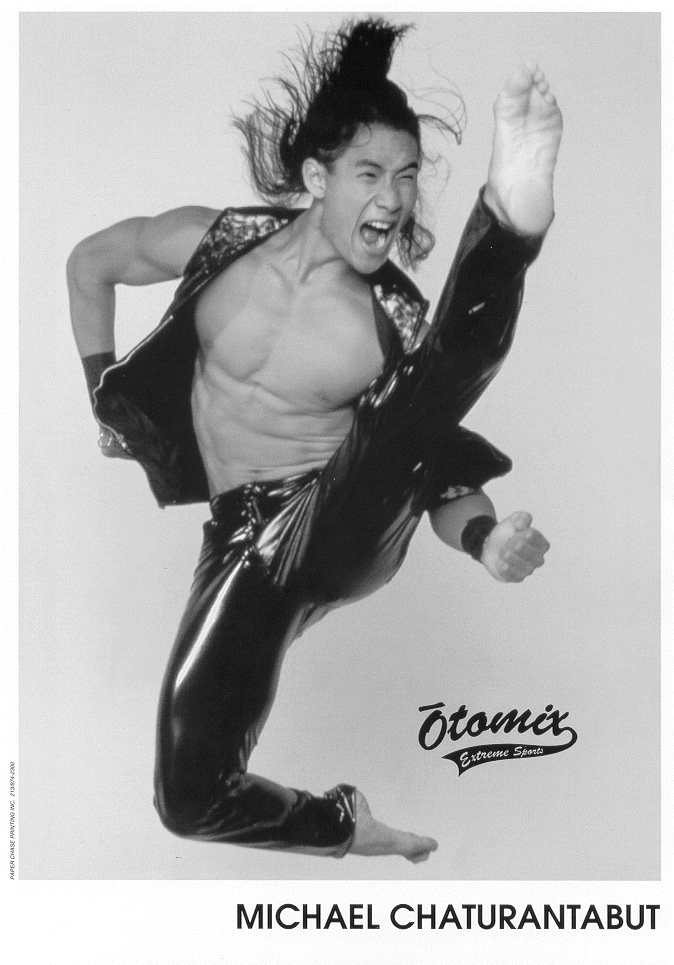
Conquering the belt test
After receiving three red stripes, students may be eligible to be promoted to a new rank, signified by a particular colored belt. The new belt serves as a symbol of continued improvement in the student's field of study. This tradition has existed only since the 20th century, but is inherited from an old tradition of wearing special belts. Prior to the 20th century, all Martial Artists wore white belts, but these would becomes darker over time as a result of all the exertion put into the practice. This is why the belts become darker as the rank of the student increases.
What to expect: The belt test can make some students very nervous, especially if it is their first. It is natural for us to feel pressure to perform admirably in front of peers or parents. After all, we would like prove that the time and energy invested in the Martial Arts over the past few months has not gone to waste. This is a normal reaction and can actually be very helpful. A little bit of nervousness can give the focus, edge and fire that you need to perform your best. Often someone who feels over-confident becomes careless and sloppy. Consequently, this student does not perform as well as a student who is more nervous.
Keeping Focused: Nonetheless, never let your nervousness overpower your presence of mind. During the belt test, try to remain focused at all times, even when other students are the ones being tested. This is very important, because you can often learn a great deal by watching the other students. Not only can you learn from their mistakes but also from paying attention to their strengths. Focused attention will enable you to test more efficiently when the time comes, and will mould you into a better Martial Artist in the long run.
Performance: When your time comes to test, focus all of your attention on the task at hand. This is the point at which you will be in the greatest danger of falling prey to nervousness , but it is also the point at which you will be most able to utilize your nervous edge. Keeping a clear focus on the task at hand and not on the nervousness will allow you to perform your best without becoming careless. Remember that being nervous will help you prepare for tournaments, where you will have to perform at your absolute best, regardless of the presence of an audience, and may prepare you for real-life situations where you might need to defend yourself or somebody else. This is not to say that you should not remain confident throughout the belt test or any other trial. It is good for you to be confident in your abilities, especially if you know that you have done the best job possible in enhancing and developing your skills; confidence is the key to key to success. Nevertheless, overconfidence and carelessness can hurt you as much as being too nervous or low in confidence. The goal of the Martial Artist is to find an inner balance, a center, that in the end will help you to succeed.
STRENGTH IN UNITY
As a Martial Arts student, you learn some very important lessons. One of these lessons is that there is greater strength in developing unity with those around you than there is in trusting everything to yourself. The good Martial Artist knows that it is better to work with a fellow student than against that student, and the shared victory is ultimately a greater victory than the victory of one person's vanity over the honest efforts of others. It is very easy to break a pencil in half. Breaking ten pencils in half is an altogether different matter.
Be Polite: Always be polite to your fellow students. The reason why you bow (a) to the Dojo, (b) before and after sparring and (c) to your instructor is to show respect. When you are impolite to others, you show disrespect not only to those students but to the martial arts community. It demonstrates greater understanding when you behave in a disciplined manner.
Show Good Sportsmanship: Learning also means being a good sport. Nobody likes to perform badly, or feel beaten when sparring. Nevertheless, every experience is a learning experience. Learn from your own mistakes and profit from them. Keep control of your temper and your actions. Sometimes students lose sight of the fact that sparring is only an exercise, and approach it as if it is a real fight. You know better than this, and you should be able to demonstrate it. Good sportsmanship is fundamental.

Work with other students: For example, if you are sparring with another student who is not as experienced as you are, do not try to show the other person up. Nothing is gained by this behavior. Try instead to work with that person so that the exercise can help develop both of your skills. Often you will be surprised at some of the things that you can learn from a less experienced student: everybody has their different strengths and weaknesses. Try to put yourself in his or her place. Imagine if your instructor, in order to demonstrate something, asked you to spar with him or her, and proceeded to do nothing but demonstrate his or her superior Martial Arts ability in front of the other students. Do you think you would benefit much from the experience?
Ask for help: A lot of students are afraid to ask a question for fear that it will sound stupid, or they will appear to be less advanced than their peers. Such behavior is only counter productive. When you do not ask for help. or you pretend to understand something that you do not, you put yourself at risk of falling even farther behind. When the time comes for you to demonstrate what you have learned, all of your confusion will be evident, and you may be more embarrassed than you would have been initially. There is no embarrassment in asking for help. Often, questions which you may think sound foolish, are shared by many other students, and can have profound consequences. The Martial Arts are very precise. Like any other disciplined art form, the nuances need to be constantly studied and repeated. When you ask questions you demonstrate your interest and respect for it. The Dojo is a place where a team of students work together to perfect a discipline. Everything depends upon that. Concern yourself with the process of learning what is going on; think about how to work with the other students so that the whole class can progress. How you behave is important. Remember that you are all learning together.
"Wizard Seminars"
"The Way of the Wizard"
A Biography of Michael Chatarantabut
 |
"An Instructor of high energy, charisma, and sense of style, Mike Chatarantabut is taking the world by storm! Straight out of the jungles of Southern Thailand, he is one of the most prolific and versatile Gen-Xer’s today! Representing a new wave in "Karate", with over 14 years of Martial arts experience, he has acquired international acclaim for his innovative martial arts skills and performances! Combining traditional Okinawan Shorei-Ryu, Tae Kwon Do, Chinese Wushu, kickboxing, yoga, dance, ballet, and acrobatics, Mike was inducted into the World Martial Arts Hall of Fame in 1992, and has captured over 50 National and International Forms and Weapons Championships! He is a three-time World Forms and Weapons Champion, and five-time North American Forms and Weapons Champion. |
Mike’s popularity overseas exploded after winning a gold medal at the 1995 I.S.K.A. World Championships, and two gold medals at the 1995 W.A.K.O World Championships in Stuttgart, Germany. Recently, Michael has appeared on covers of Europe’s top martial arts magazines, "Top Fighter", "Karate Infight", "Kick Illustrierter Kamptsport", "Karate Bushido", and clinched two additional gold medals at the 1996 ISKA World Championships in forms and weapons.
With crowds of 15,000 packing the house to catch a glimpse of him at the Budo Show ’95 in Montreal, Canada, and the renowned Budo Gala ’95 in Dortmund and Munich, he returned to sell out performances in 1997. Stunning crowds at the FIBO expo, and the Budo Gala ’97, Mike captured the Forms and Weapons Championships at the 1997 Budo Open Internationala in Essen, Germany, and was immediately picked up by Sattva Music to shoot the cover of the "Spirit of Budo" CD. Michael recently debuted in Paris at the Salon de Arts Martiaux et Sports de Combat ’97 where he dazzled 25,000 spectators with his super-intense, high flying acrobatic-martial arts routines.
These talents along with his on-screen magnetism landed him a starring role in Fox’s #1 hit TV show "WMAC Masters", where he debuted his own character creation "Wizard". Mike has gone on to win the Overall Forms and Weapons Grand Champion Title at the Arnold Schwarzeneggar Classic, and has been featured on ESPN2 and Euro-Sport, Action Pay-Per-View’s "Fight Zone", and the Dave Matthew’s Band music video, "Satellite". Currently his Del Taco and Sprite Commercial is running which was directed by the world famous Davis la Chapelle.
Together with his amazing wife, McKenzie Satterthwaite, they have launched "Team Chat International", an elite martial arts organization currently competing and touring North America. In April of 1998, "Team Chat International" opened the show with the renowned Shaolin Monks at the 13th Festival des Arts Martiaux in the Palais de Sports Bercy, France, which aired on Euro-Sport Television. For the martial arts enthusiast, they are producing Camp Chat International, a summer program combining martial arts, gymnastics, acrobats, stunt training, and the performing arts. Mike has teamed up with producers Rick and Andee Nathanson to form Pallas, a production/talent management company that just cast the feature film, "Shanghai Story" for China’s Academy Award nominated director, Ye Ying. Pallas is currently developing a television series and feature film called "Kata" for Michael's first major motion picture starring role.